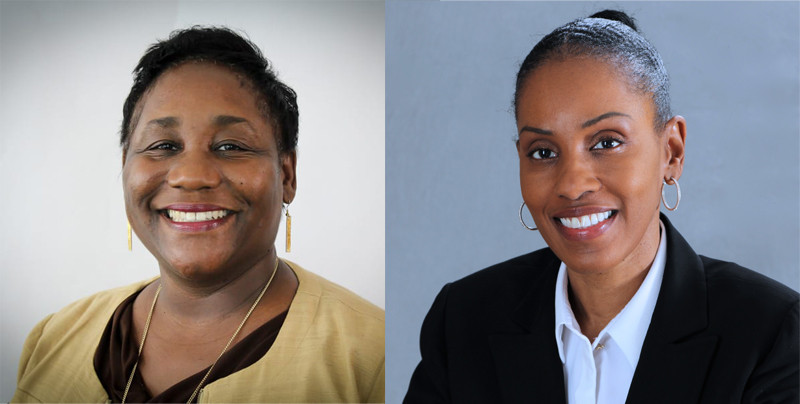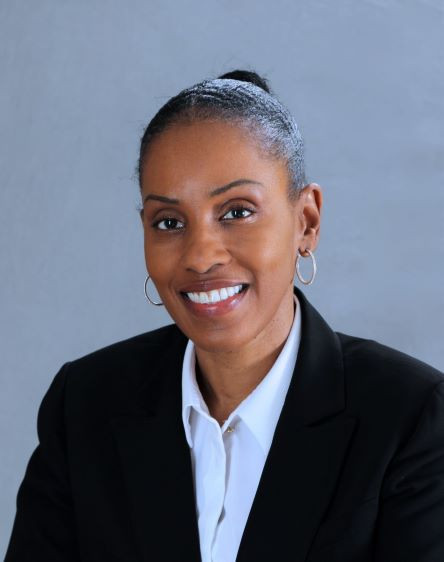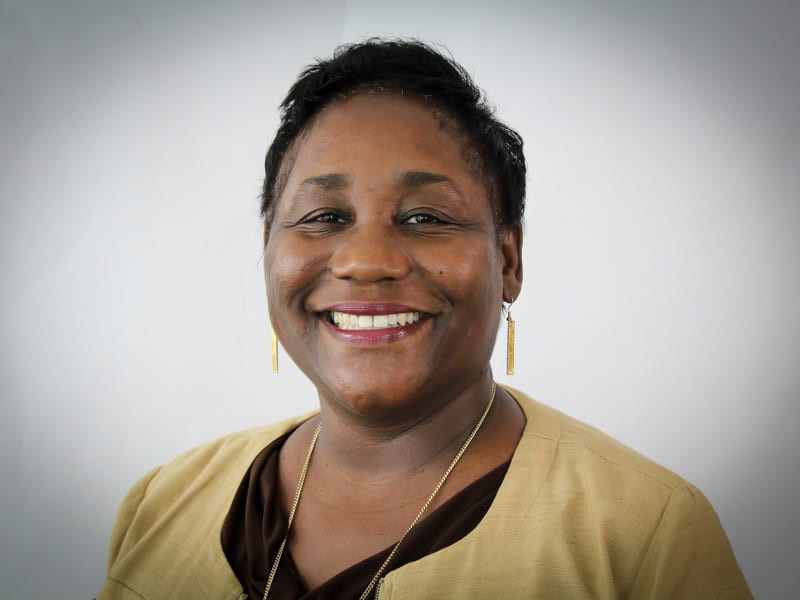
In celebration of Black History Month, we are pleased to share the stories—by way of interviews conducted via Zoom and email—of accomplished Black men and women in the health professions. Through this series of blog posts, we hope that fellow health professionals, both those practicing today and future generations, will be inspired by the remarkable contributions, significant achievements, and powerful insights of those we interviewed. In this second part of our three-part series, we speak with two Black women leaders in nursing— Kenya Beard, EdD, AGACNP, CNE, ANEF, FAAN, and Roberta Waite, EdD, PMHCNS, RN, MSN, ANEF, FAAN.

Kenya Beard, EdD, AGACNP, CNE, ANEF, FAAN, is Associate Provost of Social Mission & Academic Excellence at Chamberlain University. Dr. Beard was part of the 2012 Class of Macy Faculty Scholars, during which time she developed a multicultural training program to help nursing faculty educate culturally diverse students.
Who or what were the most important elements to your success as a leader in nursing education?
There are three elements that are critical to me. First, entering and navigating through academia can be challenging. So, having strong mentors is paramount. I was extremely fortunate to work with phenomenal leaders early on in my career like Drs. Diana Mason and Wrenetha Julion who mentored me and provided sage leadership and career advice. Secondly, there is a lot of emphasis on resiliency. However, being able to create environments that address and mitigate policies and practices that perpetuate race-related adversities is important. Thirdly, I appreciate the legacy of leaders like Harriet Tubman, Jessie Sleet Scales, and Estelle Massey Osborne who faced extraordinary obstacles, yet demonstrated what can be done with determination and faith.
What aspect of Black History is most relevant to your personal journey as a health professional?
More than 50 years ago, Martin Luther King Jr. exclaimed, “Of all the forms of inequality, injustice in health is the most shocking and inhuman.” Yet, today we still suffer from the persistence of healthcare disparities. When my father-in-law contracted COVID, I remember the paramedics not wanting to bring him to the hospital even though he was in acute respiratory distress. He was subsequently hospitalized. However, I received a call from the hospital to inform me that the guidewire was lost while placing a central line and he died shortly after. More recently, a relative was transferred to a subacute rehab facility. Our family was never informed of the spike in COVID rates at the facility, and when my relative became COVID positive, our request to hire a companion was denied. Within a week of testing positive, my relative developed severe dehydration and hypernatremia and had to be rushed to the hospital.
The National Academy of Medicine’s sentinel document, Unequal Treatment, illuminated disparities in healthcare, and these disparities are my lived reality. The American Medical Association states that bias determines “if a patient gets proper testing and treatment” and urges institutions to identify and address implicit bias. How do we operationalize this recommendation during a pandemic and how can families share their truths about COVID-related disparities without sounding ungrateful to healthcare providers who are risking their lives to provide the care that is needed? Black History Month is a time in which we can reflect, regroup, repair, and strategically respond to healthcare disparities as thought leaders; being diligent in our pursuit to deliver quality healthcare in a way that controls for bias and meets the needs of the individuals we serve.
What advice do you have for Black women nursing students who may wish to pursue a leadership role in the future?
Never be afraid to lead with your truth and allow your lived experience to guide you in a way that makes a difference. For students who become nurse educators, do not be discouraged by people who attack your research agenda or tell you that your work is not relevant and will never lead to tenure. Tenure is empowering, but it should never be one’s north star. Rather, one’s research agenda should center on helping others and connecting change to a greater purpose. With that, tenure should ensue. However, I have witnessed the disappointing reality behind that ideal.
Be encouraged. Harriet Tubman’s story illuminates how one individual might not have the capacity to help everyone. However, that does not mean we should pause downstream efforts or become idle while waiting for executive orders or anti-racist policies to bring about the seismic shift in practices that are needed. While it is imperative that we acknowledge the root causes of structural racism, we must be mindful of the glacial pace of change and give ourselves permission to address what is within our reach while society awakens to the full extent of social injustices.
Where are you finding hope that there will be meaningful change for Black Americans in 2021?
Faith is the assured expectation of what is hoped for (Hebrews 11:1), so my hope comes from my faith. Ms. Harriet Tubman could not rescue every enslaved individual, but she tried, and that is what we do right—we try to make things better. From the Emancipation Proclamation to the Civil Rights Act, these laws attempted to make the lives of individuals who were historically stigmatized better, yet the policies proved impotent to racism. Does everyone believe that all men are created equally? No, and false beliefs drive the behaviors that reify social polarization. Yet, I stay hopeful.
The COVID pandemic, spotlight on racial injustices, and physical distancing of 2020 have propagated forward-thinking agendas for 2021. President Biden’s Executive Order on advancing racial equity, the American Nursing Association’s anti-racism lens, the New York Academy of Medicine’s Health Equity Scholar’s Network, the Future of Nursing’s 2020-2030 consensus study to reduce health disparities, and the National League for Nursing’s Leading and Teaching Beyond Resilience Summit all reveal how agencies are actively confronting racism and strategizing ways to unite and become a healthier nation.
Do you have any additional comments you would like to share?
I empathize with colleagues whose mental models have been molded by historical myths. My goal is to better align the nursing profession’s commitment to social justice with the ways in which we respond to structural racism. For example, it is disturbing that the school-to-prison pipeline for Black young men has not tipped the infuriation scale for all of America. Nevertheless, I am calling on my nursing colleagues to come together and bring forth a school-to-healthcare pipeline that helps to strengthen communities, produce the racial demographics of nursing that mirror the population we serve, and advance the needle toward health equity.

Roberta Waite, EdD, PMHCNS, RN, MSN, ANEF, FAAN, is Professor and Associate Dean for Community-Centered Health & Wellness and Academic Integration at Drexel University College of Nursing and Health Professions. She is also Executive Director of the Stephen and Sandra Sheller 11th Street Family Health Services of Drexel University operated in partnership with FPCN. As a member of the 2011 Class of Macy Faculty Scholars, Dr. Waite developed the Macy Undergraduate Leadership Fellows Program, an interdisciplinary program for students in the College of Nursing and Health Professions and the School of Public Health, focusing on leadership development while concurrently fostering critical consciousness using a social justice lens.
Who or what were the most important elements to your success as a leader in nursing education?
As I reflect on this question, the answer really comes in stages.
In terms of “who” was important, one of my first, grounding influences was my mother. She was a nurse and was a true inspiration to me in the work that I do. As I progressed through nursing, one of my faculty members at the University of Pennsylvania was Dr. Freida Outlaw; she was a faculty member when I was completing my master’s degree in psychiatric mental health. From an academic standpoint, she was foundational to me, and we still keep in touch today. Our relationship evolved from that of mentor and mentee to now colleagues and friends. Over time, in terms of education and how I think about educating, my professional organizations have been quite influential.
As far as the “what” elements, an associate dean at Drexel once told me, “you have fire in your belly; you are really driven”—traits that I believe also contributed to my success. During those first two years after completing my doctoral program, I learned a lot about what I did not know. I went to my dean and associate dean and declared that I needed to get a K Award or a T32. There were certain skills that I knew I needed to deepen in order to be successful, and I ultimately got a T32 position at the University of Pennsylvania. It took some negotiating with my home institution to be released for those two years in order to take the position, but I outlined how the position would benefit me, the college, and so forth. The post-doc position was life-changing from a research and scholarship perspective as well as networking with interprofessional colleagues at the School of Medicine. I had to learn to take constructive criticism, particularly about my writing skills, especially research writing skills. The positive outcome was that I was able to take in that criticism, and when I left the fellowship, I was able to publish eight peer-reviewed papers a year.
I think that I also stayed very focused in my career goals and had an ability to say “no” when asked to do things that did not help further those goals. For example, in working toward tenure, I paid careful attention to others as they went up for tenure review, looking to see what they did in order to be successful. At that same time, I started to be tapped for administrative positions. While some of these positions sounded interesting, I knew they would not help me with respect to tenure, so I declined. After being asked a few times to take on these types of positions, I finally asked for the requests to stop until after I got tenure. After achieving tenure, I got an offer that was ideal as an assistant dean, which was a new position I helped to co-create. Several years later I also co-created my current Associate Dean’s role with my dean.
What advice do you have for Black women nursing students who may wish to pursue a leadership role in the future?
Be able to identify your gifts and skills, as well as the areas where you need to grow. Leadership is more than knowing how to do a budget or leadership theory; it starts with self.
Mentorship is also important; seek it out within a professional organization if the right mentoring is not readily available within your school. The National Black Nursing Association and the Association for Black Nursing Faculty were instrumental for me; the strength, empowerment, and advancement I received from my colleagues in these associations were more than what I got from the greater nursing profession. Many of my partnerships and much of my writing came from the relationships I had with fellow members and people I networked with at comparable professional organizations.
Finally, do not limit yourself to the nursing profession when looking for mentors. I have many good mentors from outside of nursing, which was intentional. Because of my background in mental health, I work with psychologists, psychiatrists, and social workers. My mentors come from many disciplines outside of nursing; they will make you much more well-rounded, as well as broaden your network.
What aspect of Black History is most relevant to your personal journey as a health professional?
Learning it, truly learning it.
Black History is not taught to you in school. In some respects, I had a good education, but it was not an equitable education in the content that I learned. Over the past eight years, I have done a true deep dive into Black History, as it is aligned with the work that I do and the communities I serve. If I just accepted what I learned in school, I would be complicit in doing more harm than good. In learning the history and understanding why I see what I see, how did we get to where we are, why we need to focus on racial justice, what is the root of the anti-Black sentiment—asking these types of questions is the only way to make sense of the situation and to progress from being truly oblivious.
Kenneth Hardy, PhD, was influential in my understanding of racial justice. Eduardo Bonilla-Silva, PhD, has also been influential in understanding the dynamics around race and racism. My work revolves around trauma, and racism is a trauma. Understanding the radical healing that needs to take place with respect to racism is important, too. Wizdom Powell, PhD, MPH, does some amazing work dealing with the healing of racial trauma.
Where are you finding hope that there will be meaningful change for Black Americans in 2021?
The structures of racism and inequality were created by man, and they can be dismantled and rebuilt by man. What we are living through and living with, what we have endured, our legacy, is not happenstance. It is a system that was intentionally created. It takes more than just the theoretical to affect change; it takes policies, but also belief of the heart and of the mind that social justice and change are possible. I believe, if the people who want to create change can get proximal to the issues and grapple with the challenges in a bold way, leaning into their discomfort, that growth is possible. As people are able to grow and learn and be vulnerable, we can create a change. We as individuals and as a collective can create change if we desire to.
Is there anything else you wish to share?
As I read through how we have arrived here collectively, as frustrated as I get, I harken back to my ancestors, what they had to endure, and I think “this is nothing!” I am not saying it is right, but I am empowered and emboldened that we have to make this a better America.